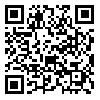BibTeX | RIS | EndNote | Medlars | ProCite | Reference Manager | RefWorks
Send citation to:
URL: http://zanko.muk.ac.ir/article-1-162-en.html
Backgrounds & Aim: The present research investigates the effects of neurofeedback on improving auditory memory of Islamic Azad University of Kermanshah's student (2014-2015).
Material and Methods: Method of this present study was semi-experimental with pre-posttest design with control group. Study's population group was all Islamic Azad University of Kermanshah's student. By using available sampling, 30 students who received two standard deviations below the average subscale of auditory memory test were chosen, and assigned to the experimental (15 people) and control (15 people) groups, randomly. Used instruments were subscale auditory memory of Wechsler test (WMS. III) that included likeness and digit span. Ten sessions of neurofeedback with Demos method (2005) were administered for experimental group twice a week. At the end of the intervention, both groups were evaluated again by the test. The data were analyzed by covariance analyzing.
Results: The results showed that neurofeedback's training was effective in improving auditory memory in experimental group (P<0.001).
Conclusion: According to the findings, it can be concluded that neurofeedback can be effective as a useful tool for enhancing cognitive abilities and mental functioning, therefore using this, is recommended in related areas.
Received: 2016/12/2 | Accepted: 2016/12/24 | ePublished: 2017/04/18
| Rights and permissions | |
 |
This work is licensed under a Creative Commons Attribution-NonCommercial 4.0 International License. |





